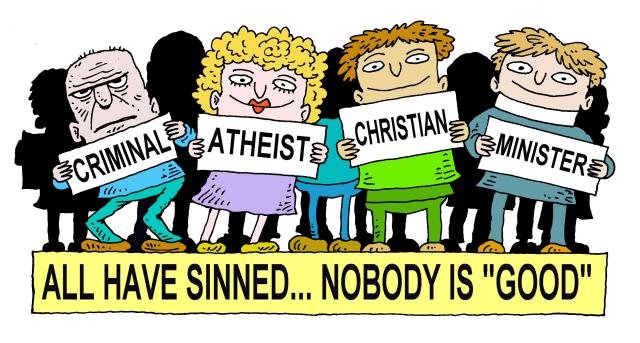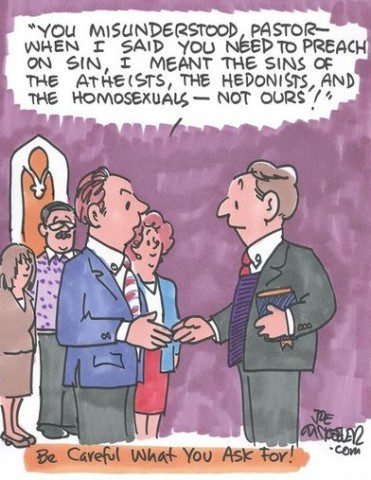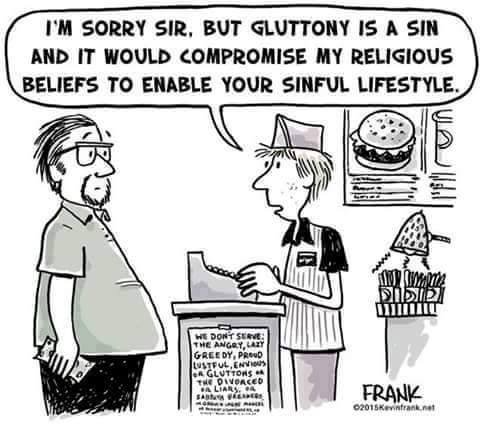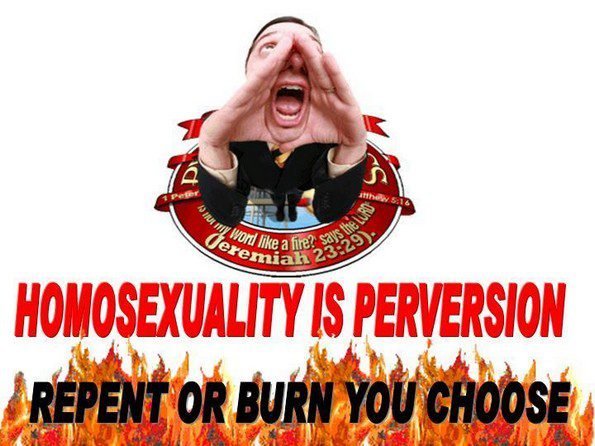
Note: I am well-schooled in all the various Christian beliefs on sin and salvation. The statements that follow generally reflect what Evangelicals believe. I know that not all Evangelicals believe these things without exception. Please don’t bitch, moan, and complain about my generalizations. I get it, you are special. You, and your denomination and church, are True Christians.®
Sin. According to Evangelicals, sin is transgressing against God; breaking the law of God. We daily sin in thought, word, and deed, preachers say. We commit sins of omission (neglecting to do something we should) and commission (doing things we shouldn’t). Evangelicals believe that all humans are sinners; that we were born with sin natures; that we don’t become sinners, we are sinners. The first human beings, Adam and Eve were created perfect, without sin. However, they ate the forbidden fruit from a tree and plunged the entire human race into sin. We have no choice in whether to be sinners. The first Adam sinned, and as his progeny, we are, by nature, sinners too.

According to Evangelicals, The Bible is the inspired, inerrant, infallible Word of God. Moses, the prophets, Jesus, the apostles, and Paul had a lot to say about sin; what human behaviors are sins against the God of the Bible. And for the past 2,000 years, preachers, evangelists, youth pastors, missionaries, and Sunday school teachers have been hitting believers over the head with the sin stick, reminding them this or that behavior will harm their relationship with God, bring his judgment upon their heads, and cost them loss of rewards in Heaven after they died. Preachers and their fellow congregants go out into the highways and hedges, reminding the unwashed, uncircumcised Philistines of the world that they too are sinners. And unless they repent of their sins and become Evangelical Christians, they will go to Hell/Lake of Fire after they die, facing eternal punishment and torture for their sins.
Sin is a religious construct used by Evangelical clerics and churches to induce guilt and fear in people. These same clerics tell fearful sinners that they have the solution for their sin problem: Jesus. If sinners will repent of their sins and put their faith and trust in Jesus, he will save them from their sins and give them eternal life in Heaven. In other words, sects, churches, and preachers invented a problem (sin) and invented a solution for their problem (salvation, new birth).
Salvation supposedly breaks sin’s hold on Evangelicals. No longer are they in bondage; no longer are they controlled by Satan and demons. Week after week, Evangelicals hear sermons about sin, grace, and victory in Jesus. Yet, despite all of this, most Evangelicals still feel fearful and guilty. They often wonder, “Am I right with God?” I spent my entire Christian life, as did my wife, feeling that we never measured up; that God was not pleased with us; that no matter what we did for Jesus and the church, it was never enough; that we fell short. So we did what all Evangelicals do: we tried harder. We read the Bible more; we prayed more; we gave more; we witnessed more; we devoted more and more time to loving and serving Jesus and faithfully, and selflessly working in God’s vineyard — the church.

I don’t remember a day when I didn’t feel less than. I certainly believed in and cherished the grace of God, yet I continually struggled with thinking God wanted more from me; that if I just committed more of my time, energy, talent, and money to God’s kingdom that I would one day arrive. Alas, there was always more to do. So many sinners who needed Christ. So many church members who lacked spiritual maturity. Why were they so lazy? Why didn’t they care about the things of God? With evil all around me, I believed I had to do everything possible to protect not only my wife and children, but also the church — the people who looked to me to teach them, shepherd them, and provide them with a shining example of a successful Christian.
Of course, I wasn’t a successful Christian. No Evangelical is. For all their talk about Jesus and deliverance from sin, Evangelicals sin just like the rest of us. Spend enough time in an Evangelical church, and you learn how to play the game. You learn the lingo. You learn that perception matters, so you present yourself as one who has found victory in Jesus, knowing that away from the church and behind closed doors, reality is much different. The Apostle Paul said that the Christian life was one of struggle with sin; not doing what we should; and doing what we shouldn’t. Evangelicals believe the Holy Spirit lives inside of them. He is their teacher and guide, giving them everything they need that pertains to life and godliness. Yet, Evangelicals also believe that they have a sin nature; that life is a constant struggle between the spiritual and the flesh. Jesus may have saved them, but sin remains.
Unfortunately, when Evangelicals deconvert, they leave the faith with minds filled with harmful beliefs. There is no Men in Black mind wipe when you deconvert. That’s why it often takes years to reprogram ourselves; to flush our minds of damaging beliefs and practices. I was part of the Evangelical church for fifty years. I may have left Christianity in November 2008, but a lifetime of indoctrination and conditioning remained. My counselor told me years ago that my life was like an onion that had to be peeled one layer at a time. I am where I am today because of that peeling process. This process has been painful, with many tears and self-reflection. I suspect many readers know exactly what I am talking about.
Five decades of being hit with the sin stick caused a lot of harm. Just because I became an atheist doesn’t mean that a lifetime of being told this or that human behavior was a sin went away. Every aspect of my thinking had been corrupted by Evangelical Christianity. After leaving Christianity, I knew that I had to rebuild my life and thinking from the foundation up. This was not an easy process, and it continues to this day.
The first thing I did was get rid of all my Bibles, except for my leather-bound Oxford King James Version preaching Bible. Second, I stopped reading the Bible. It was part of the problem, containing many verses that were immoral and anti-human. As secular humanism took root in my life, I came to see how harmful to not only myself but to other people were many of the things I once believed. I already knew the central claims of Christianity could not be rationally sustained (please see The Michael Mock Rule: It Just Doesn’t Make Sense). My struggle was with morality and ethics. While certainly, the Bible contains some wisdom and moral teachings, most of it was irrelevant and contrary to modern sensibilities, so I shelved it, where it remains to this day.

The next thing I did was abandon the concept of sin. Sin was a religious construct, not a humanistic one, so I stopped using the word. Instead of judging myself and others through a sin paradigm, I looked at myself and fellow humans from a good and bad behavior perspective. I made lists on paper and in my mind of behaviors that I thought were good and bad. I also made a list of behaviors that are indifferent or situational. Life became much harder for me. I actually had to reason and think instead of just saying, “The Bible says . . . end of discussion.” Over time, I noticed my bad behavior list becoming smaller and smaller; that some behaviors could be wrong for me, but right for someone else. I concluded that I had been a judgmental prick most of my life; that the way forward for me was one of non-judgmentalism. I still struggle with being judgmental. Damn, if I don’t have an opinion about everything. 🙂
I certainly think certain human behaviors are bad. I subscribe to the notion that my goal should be love, kindness, and goodness; that human flourishing and care for other animals and the world we share is best. My focus is on what I can do to make the world a better place. A cheap cliche? Perhaps, but imagine if all of us focused on making the world a better place; on loving our neighbors as ourselves; on promoting love, kindness, and prosperity for everyone, and not just our tribe or country. Imagine if we stopped calling countless human behaviors sins punishable by death and eternal punishment. Imagine if we kept our noses out of the private lives of others; that who people love, marry, and fuck is none of our business.

The concept of sin and redemption categorizes and divides us; in and out, us vs. them; saved or lost; Heaven or Hell. Religion, especially Evangelical Christianity, is antithetical to unity and peace. Jesus himself was divisive:
Suppose ye that I am come to give peace on earth? I tell you, Nay; but rather division: For from henceforth there shall be five in one house divided, three against two, and two against three. The father shall be divided against the son, and the son against the father; the mother against the daughter, and the daughter against the mother; the mother in law against her daughter in law, and the daughter in law against her mother in law. (Luke 12:51-53)
How did you deal with the concept of sin, post-Jesus? Do you still struggle with “sin?” Please share your “sinful” thoughts in the comment section.
Bruce Gerencser, 68, lives in rural Northwest Ohio with his wife of 47 years. He and his wife have six grown children and sixteen grandchildren. Bruce pastored Evangelical churches for twenty-five years in Ohio, Texas, and Michigan. Bruce left the ministry in 2005, and in 2008 he left Christianity. Bruce is now a humanist and an atheist.
Your comments are welcome and appreciated. All first-time comments are moderated. Please read the commenting rules before commenting.
You can email Bruce via the Contact Form.

I find it a relief to not think about “sin.” Like you, I want to be a better person every day. Focusing on sin made me worse, as I would be consumed with the mote in another’s eye, while the plank in mine was invisible to me. Focusing on being a better person helps. Trying to be less judgmental helps.
Ah, sin. As an evangelical, there was a tremendously long laundry list of acted sins and thought sins. The thought sins were hardest because I just couldn’t control my mind.
I remember watching my grandma through the years. I lived with my grandparents, so I knew them well. My grandpa was devoted to the church, but for his outgoing nature it was more about community, something useful to do, and the rules didn’t seem to bother him much. I never saw him having daily Bible devotions. No, he was constantly out in the community during his time off helping people, whether they went to our church or not. It didn’t matter, and I don’t remember hearing him proselytizing – someone had a need, he would help – if he couldn’t do it, he found someone who could. He was truly a people person. My reserved grandma, on the other hand, studied her library of Bible concordance and books. She taught Sunday school and Women’s Missionary Union (except for the few years where she rarely left the house when her elderly mother lived with us). Grandma became a recluse for a few years – wouldn’t go ANYWHERE unless someone could be in the house with her mother. She became more dependent on Christian radio and her books. Looking back, I see that isolation led her to depression and obsession with being “perfect” for God. She denigrated herself so much for her thoughts, her rebellious nature, etc. It’s a wonder she survived those years until my grandfather forced her to put her mother in a nursing home after several months of hospital bed equipment and no help other than my grandfather and me for a bedridden elderly woman (who was always mean AF even prior). Anyway, my grandma, whose world was reduced to her house and taking care of her mother, fixated on sin sin sin. She fixated on boycotts of “anti-Christian” companies as proscribed by Focus on the Family or Anita Bryant or whatever Christian had a burr in their bonnet about.
One of my friends who has gone back and forth between Episcopalian and Greek Orthodox traditions and is quite well read explained “sin” well. He said in the traditions he was familiar with, “sin” is anything that keeps you from being your best and thus separating you from God. It is not to be punished but is rather something you should work on personally to be a better person. He viewed the evangelical definition of “sin” as a long list of rules, and breaking any rule deserves punishment. It’s more of a retribution process than a growth process. While I don’t use the word “sin”, I liked his version of the concept better. I can see certain things that I work on to become a better person. I don’t need threat of punishment or hell, I just need to put in the work to do and be better. Not cursing though. Fuck that. I will always curse! 😁
Obstacle, I have heard your friend’s definition of “sin” before. It’s actually pretty useful, even now that I’m an atheist. I don’t use the word “sin,” but I think of actions that keep us from being our best and most ethical selves can be seen in the way your friend sees “sin.” Of course, what now falls into that category, for me, are not sexual preferences and practices (unless they exploit the vulnerable, such as children) or drinking, smoking (as much as I dislike it) cussing or dressing differently from what’s accepted.
I have a question no one can answer. Why to humans torture themselves so much with religion? Luckily I was not brought up by parents who never really “believed” anything. To someone like me who once I learned basic math in junior high school and basic science in high school all this religion stuff looks like an anthropromorphism used by probably stone-age people trying to explain the natural world around them. Now religious societies are all “in their own little box” and anyone outside that box is BAD. Similar things go on with politics.
I have my problems too. I will never feel like I studied enough the first time in college and failed by not getting a bachelor’s degree. (I went back to another college later and got one). I never feel like I am good enough. These things are common in people who work in information systems and engineering.
Maybe we need a society which tries to value every member and quit torturing themselves and other people.